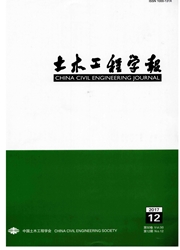

 中文摘要:
中文摘要:
将FEMA440考虑土-结构相互作用的能力谱方法与桥梁脆弱性分析相结合,提出能够综合考虑地基柔性效应、运动学效应和基础阻尼效应的桥梁脆弱性分析方法,再结合所统计的与我国桥梁抗震设计规范相容的强度折减系数谱,对某城市高架梁式桥进行脆弱性分析,建立相应的脆弱性曲线,并与非线性动力时程分析法和不考虑土-结构相互作用的脆弱性分析法所建立的脆弱性曲线进行比较。计算结果表明:所建立的考虑土-结构相互作用的脆弱性曲线与非线性动力时程分析的计算结果十分接近,而不考虑土-结构相互作用的脆弱性曲线则与实际情况有较大差距。可见,该方法可以较为准确地对考虑土.结构相互作用的桥梁结构进行脆弱性分析,这也验证了该法应用于我国桥梁结构抗震性能评估的可行性。
 英文摘要:
英文摘要:
By combining vulnerability analysis with capacity spectrum method considering soil-structure interaction effects in FEMA440, a new bridge vulnerability analysis, which considers flexible foundation effect, kinematical effect and foundation damping effect, is proposed. Based on the reduction factor spectra that are compatible with Chinese code of seismic design for bridges, the vulnerability analysis considering soil-structure interaction effects is applied in the vulnerability analysis of the viaduct. The vulnerability curves of the viaduct are obtained. By comparing with nonlinear time-history analysis results and vulnerability curves without considering soil-structure interaction effects, it can be concluded that the vulnerability analysis considering soil-structure interaction effects is more accurate than the vulnerability analysis without considering soil-structure interaction effects. So, it can be found that the new vulnerability analysis method proposed in this paper can obtain more accurate results by considering soil-structure interaction effects. Meanwhile, the practicability of this new method for bridge seismic evaluation is also certified.
 同期刊论文项目
同期刊论文项目
 同项目期刊论文
同项目期刊论文
 期刊信息
期刊信息
